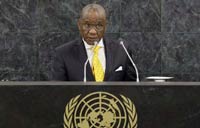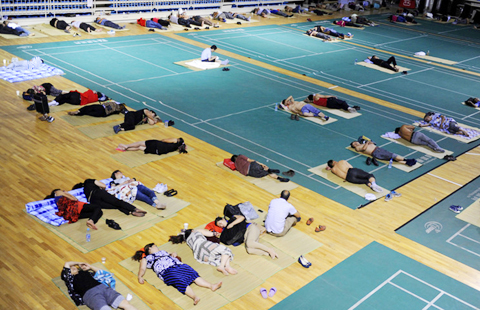
|
 |
| Lesotho PM flees to South Africa after military coup |
Lesotho's Prime Minister Thomas Thabane, who sought refuge in South Africa after the military raided his residence on Saturday, is also heading home.
"We are on our way home now, most probably we will be in Lesotho tomorrow," Thabane's aide Samonyane Ntsekele said Monday.
The political unrest, which Thabane claimed to be an attempted "coup" against him by the military, forced Thabane to flee to South Africa and paralyzed the government.
Thabane's rival, Deputy Prime Minister Mothetjoa Metsing, and the military, however, have denied Thabane's accusation.
One soldier and four police officers were injured Saturday during gunfire exchange between police, largely loyal to Thabane, and the army, believed to be loyal to Metsing.
However, the army has denied staging a coup and said their actions on Saturday were designed to prevent the police from arming political "fanatics."
Although the army has since been back to the barracks, the latest actions have further weakened the country's already fragile coalition government.
Following the political unrest starting on Saturday, member countries of the regional bloc, the Southern African Development Community (SADC), were mobilized quickly to find a political solution to the crisis.
South African President Jacob Zuma, who is also chairperson of the SADC Organ on Politics, Defence and Security Cooperation, convened a meeting Sunday evening, which was attended by foreign ministers from Zimbabwe and Namibia, and a delegation of the Lesotho coalition government consisting of Thabane, Metsing and other leaders.
The leaders of Lesotho's coalition government agreed on a roadmap with clear timelines on how to remove the parliament prorogation, said a joint statement issued after the meeting.
They also agreed that the political and security situation had deteriorated, which needed immediate intervention and support from the SADC, the statement said.
According to the statement, the leaders were committed to working together to restore political normalcy, stability, law and order, peace and security in the kingdom, as provided by the Windhoek Declaration of 2006.
The leaders further agreed to issue a joint statement, appealing for calm and restraint with a view to rapidly bringing law and order back to the kingdom.
The SADC will also send observers to Lesotho as agreed during the meeting.
Lesotho formed a coalition government in 2012 following hotly contested elections.
Trouble has been brewing in the kingdom since June, when Metsing, who is also the leader of the Lesotho Congress for Democracy (LCD), vowed to push for a parliamentary vote of no confidence against Thabane.
Thabane then suspended parliament to avoid the vote of no confidence. On Friday, Army Lieutenant General Kennedy Kamoli was sacked and replaced by Maaparankoe Mahao for allegedly providing protection to Metsing without Thabane's consent, but the army rejected Mahao's appointment.
Military coups are not uncommon in Lesotho. In March 1998, the ruling Lesotho Congress for Democracy Party won 79 of the total 80 seats in parliamentary elections, but allegations of vote fraud soon surfaced. After a failed lawsuit by opposition parties, widespread rioting broke out.
The SADC intervened with an operation codenamed Operation Boleas and led by South Africa, whose National Defence Force sent troops into Lesotho to quell an ensuing coup.








